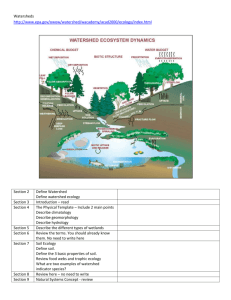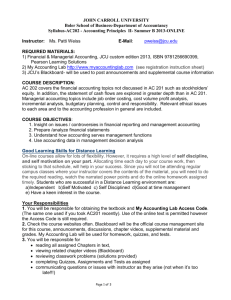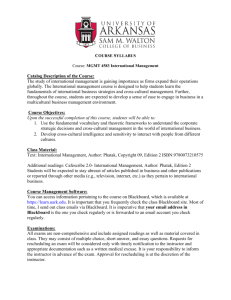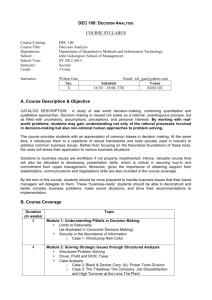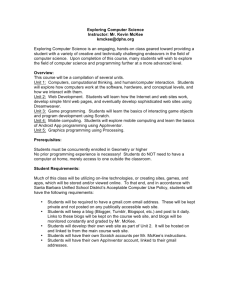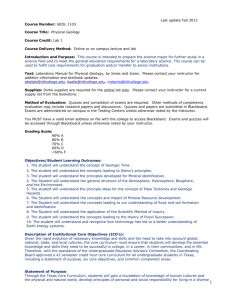FOR 442/642 Watershed Ecology & Management
advertisement
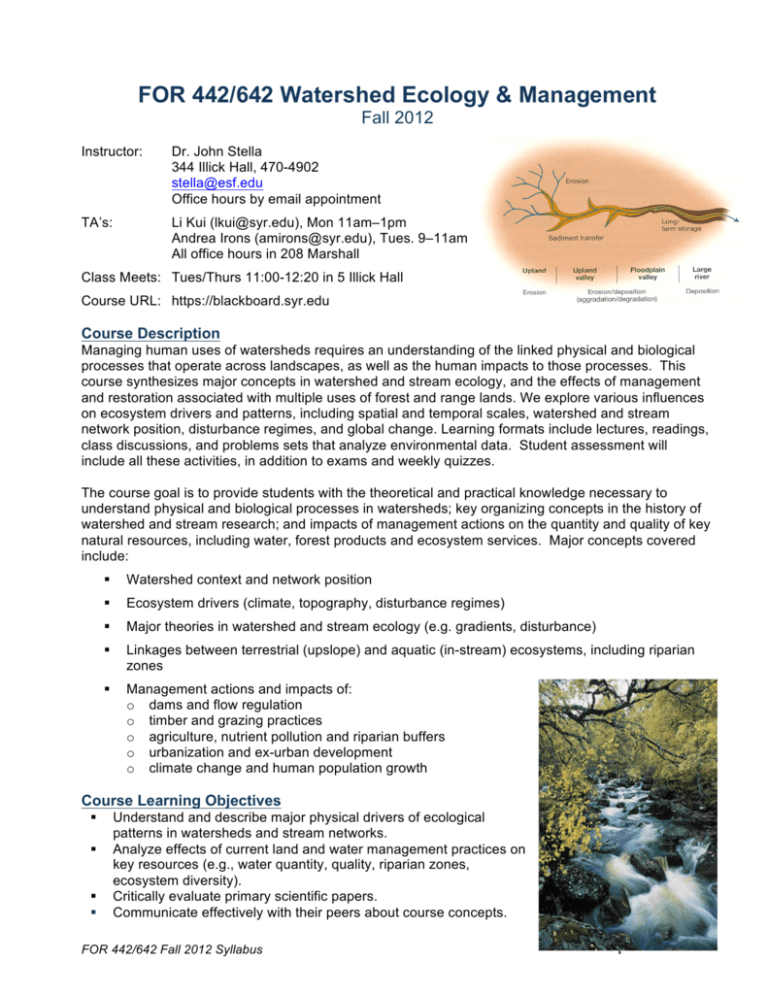
FOR 442/642 Watershed Ecology & Management Fall 2012 Instructor: Dr. John Stella 344 Illick Hall, 470-4902 stella@esf.edu Office hours by email appointment TA’s: Li Kui (lkui@syr.edu), Mon 11am–1pm Andrea Irons (amirons@syr.edu), Tues. 9–11am All office hours in 208 Marshall Class Meets: Tues/Thurs 11:00-12:20 in 5 Illick Hall Course URL: https://blackboard.syr.edu Course Description Managing human uses of watersheds requires an understanding of the linked physical and biological processes that operate across landscapes, as well as the human impacts to those processes. This course synthesizes major concepts in watershed and stream ecology, and the effects of management and restoration associated with multiple uses of forest and range lands. We explore various influences on ecosystem drivers and patterns, including spatial and temporal scales, watershed and stream network position, disturbance regimes, and global change. Learning formats include lectures, readings, class discussions, and problems sets that analyze environmental data. Student assessment will include all these activities, in addition to exams and weekly quizzes. The course goal is to provide students with the theoretical and practical knowledge necessary to understand physical and biological processes in watersheds; key organizing concepts in the history of watershed and stream research; and impacts of management actions on the quantity and quality of key natural resources, including water, forest products and ecosystem services. Major concepts covered include: § Watershed context and network position § Ecosystem drivers (climate, topography, disturbance regimes) § Major theories in watershed and stream ecology (e.g. gradients, disturbance) § Linkages between terrestrial (upslope) and aquatic (in-stream) ecosystems, including riparian zones § Management actions and impacts of: o dams and flow regulation o timber and grazing practices o agriculture, nutrient pollution and riparian buffers o urbanization and ex-urban development o climate change and human population growth Course Learning Objectives § § § § Understand and describe major physical drivers of ecological patterns in watersheds and stream networks. Analyze effects of current land and water management practices on key resources (e.g., water quantity, quality, riparian zones, ecosystem diversity). Critically evaluate primary scientific papers. Communicate effectively with their peers about course concepts. FOR 442/642 Fall 2012 Syllabus 1 Course Readings Readings from individual book chapters and journal articles will be posted to the course web site (https://blackboard.syr.edu). Some sources for these will also be on reserve at Moon Library, including: Allan, J.D., and Castillo, M.M. 2007. Stream Ecology, 2nd Ed. Springer. Naiman, R.J., Decamps, H., McClain, M.E. 2005. Riparia: Ecology, Conservation, and Management of Streamside Communities. Elsevier. Satterlund, D.R and Adams, P.W. 1992. Wildland Watershed Management, 2nd Ed. Wiley, NY. Student Evaluation Students will be evaluated based on tests, quizzes, homeworks, and additional assignment as appropriate. Students in FOR 642 will complete additional homework questions/assignments. Grading formula: § Quizzes (weekly) § Tests (in-class midterm & final) § Homeworks & projects 20% 40% 40% Quiz and Homework Policy Quizzes on the week’s reading will occur on Tuesdays within the first 10 minutes of class. They are intended to reward on-time attendance and adequate class preparation. Quizzes missed because of lateness or unexcused absences cannot be made up and result in a zero. There is no dropping the lowest grade. Students who miss quizzes because of illness, conference attendance, or family death are excused from class and must email the TA within two days of missing class. Homeworks will not be accepted late without prior permission of the instructor. Expectations & Academic Integrity § Students are responsible for information emailed and posted on the Blackboard site and should check the web site and their “@syr.edu” email address daily. § Students are responsible for their own work. Unless specified by the instructor, assume that all assignments, tests, quizzes etc. are to be done alone with no outside help. If there is any question as to what people or resources are allowed to be consulted for assignments (including internet resources), it is the students’ responsibility to ask the instructor. § It is the students’ responsibility to know what constitutes proper attribution of sources and plagiarism. Use of all reference materials, including internet sources, must be appropriately cited. Academic dishonesty will be result in a zero grade for the assignment and/or course, and potentially other disciplinary actions. For more information, see the Academic Integrity Handbook at: http://www.esf.edu/students/handbook/integrity.pdf § Texting, emailing, or web surfing are not permitted during class. These activities are disrespectful to your fellow students and to the instructor; students found engaging in these activities will be asked to leave class for the day. All phones, laptops or other devices should be silenced during class. Course Schedule The course schedule is subject to change; updates will be posted on the Blackboard web site. FOR 442/642 Fall 2012 Syllabus 2

